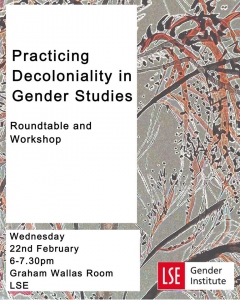On Wednesday 22nd February 2017, PhD students at the Gender Institute organised a roundtable discussion and interactive workshop titled Practicing Decoloniality in Gender Studies. This short series of posts presents the transcripts of the three speakers’ discussion papers, kicking off with Priya Raghavan’s reflections on her encounters with decoloniality in the neoliberal academy during her first year of PhD studies.
First, I must qualify that I am by no means a decolonial or post-colonial scholar. I have only very recently been exposed to these theories, which in itself is an indication of the marginality of this species of critique within the academy, and how limited access to it really is. Given my lack of experience or expertise in this area, a rather telling reality is that I was invited to speak on a panel on decoloniality in part because, otherwise, we would have had an exclusively white panel, presenting a rather vivid display of who precisely wields epistemic authority.
That said, I am very grateful to be part of what I consider an absolutely crucial conversation, and would like to use this opportunity to briefly interrogate, and critically examine, this project of decolonising gender studies. I want to discuss some of my concerns not with decoloniality or decolonising theory itself, but the particular manner in which it has been engaged with by us as gender scholars in the neoliberal academy.
My first discomfort was triggered by how this project is often framed to begin with: around the question of what can gender studies learn from decolonial theory? While ‘learn’ is certainly a less jarring word than ‘take’, the sentiment remains similarly acquisitive: what we are asking, in effect, is in what ways can we appropriate and instrumentalise the tools of this body of work, and place them in the service of our own “radical” intellectual and political agenda? This almost inevitably extractive framing does a form of epistemic violence in itself, and runs the risk of what my colleague Alaa El-Mahrakawy has called ‘colonising decoloniality’.
There is a secondary issue inherent to this particular framing of decolonising gender studies: it lays bare very problematic imaginations of what decoloniality and gender studies as projects are to begin with. It seems to suggest that somehow, decoloniality and gender or feminism are in any way discrete, that they can be disaggregated, that gender and decoloniality can ever actually meaningfully be imagined without one another.
My second anxiety around this broader project concerns the risk of de-politicising decoloniality, which as we all know, is a necessarily radical political project in itself. In our academic uptake of this concept, I worry that we fall into the trap of relegating these revolutionary tools to the inaccessible lexicon of epistemology, methodology, ontology… etc. As we historicise and particularise decoloniality in our papers and our classrooms, we often forget to see and challenge coloniality in how it is manifest in our immediate surroundings. We forget to rage against the unconscionable treatment of BME cleaners in our very buildings, and to participate in their movement on our very campus. We neglect to question why the walls of the gender institute are most prominently and visibly decked with posters of the suffragettes, a shining example of a classed, colonised feminist struggle. We forget to examine which racialised bodies occupy which spaces. This by no means is meant as some sort of sanctimonious, moralising diatribe, as all of these and more are omissions that I myself am more guilty of than most.
Which brings me to my final, most visceral and personal struggle with how the academy engages with decoloniality: my role and complicity in a phenomenon which one of my favourite spoken word poets and activists, Alok Vaid-Menon, memorably describes as bring in brown to keep black down. When I examine my own position within the academy, I realise that I am hardly the decolonial solution: I am here because I have been trained, over decades, through my class and caste privilege, to contort my tongue and mind to accommodate the words and thoughts of the imperial Western cannon. I am far from able to present the counter-hegemonic narrative because it is unknown and unknowable to me. I am unable to disrupt, displace and dismantle, or even gently bruise the coloniality of knowledge because I participate in it. My presence serves to brownwash our white institutions in the least threatening way possible. I am the model minority, conveniently interpellated as the native informant, and participating in its fiction. I am essentially the smokescreen, the carefully selected, anointed chosen brown, to keep black down.
The solution, then, cannot and will never be simply or exclusively to populate our panels, classrooms or even staffrooms with more coloured bodies. The challenge is to constantly, critically interrogate the very material, classed, racialised and gendered conditions that have made possible the current composition of our academic spaces.
 Priya started her LSE funded doctorate at the Gender Institute in 2016. Her work evaluates discourses around sexual violence in India, and explores possibilities for agency and resistance within gendered regimes of sexual violence. Prior to joining the GI, Priya worked with feminist NGO Nirantar in New Delhi on its Gender and Sexuality programme
Priya started her LSE funded doctorate at the Gender Institute in 2016. Her work evaluates discourses around sexual violence in India, and explores possibilities for agency and resistance within gendered regimes of sexual violence. Prior to joining the GI, Priya worked with feminist NGO Nirantar in New Delhi on its Gender and Sexuality programme


